WHAT YOU SHOULD KNOW ABOUT MBA, Executive MBA, DBA RANKINGS and ACCREDITATIONS (FAQ)
1. Are EMAS and its MBA, Executive MBA and DBA programs accredited by the Russian state?
Yes, EMAS is accredited by the Russian state. All EMAS MBA, Executive MBA & DBA programs are taught in accordance with the Federal Law on Education in the Russian Federation.
2. What global international and national rankings include EMAS? What is the proof of the quality and value of EMAS MBA programs?
When it comes to top online MBA programs, EMAS stands out as one of the best in Europe. We take pride in our accreditation and the recognition we've received in prestigious global international rankings.
The first thing you should know is that only a very limited number of business schools, like EMAS, offer the quality of teaching that leads to prestigious degrees. We are part of the elite group of only 200 business schools worldwide whose MBA, Executive MBA (EMBA), and Doctor of Business Administration (DBA) programs are consistently included in renowned global international rankings.
Our commitment to excellence has earned us high rankings in these rankings, providing tangible proof of the quality and value of EMAS MBA programs. We understand that when choosing the best business school for study, accreditation, rankings, and reputation matter. Programs of schools that are not included in global international rankings may not offer the same level of excellence and prestige that EMAS provides to its students.

-
WORLD and EUROPE (Global rankings and recognitions of EMAS MIM, MBAs, Executive MBAs, and DBAs), 2024/2025:
★★★ 4.8 out of 5 (over 40 alumni ratings!) - Students and graduates Satisfaction score for EMAS MBA, Executive MBA, and DBA programs, according to EDUopinions, the world's leading portal that collects student satisfaction reviews on educational programs and monitors and ranks MBA, EMBA, and DBA programs worldwide.
★★★ 4.8 out of 5 (over 50 alumni ratings!) - Students and graduates Satisfaction score for EMAS MBA, Executive MBA, and DBA programs, according to StudyPortals, the leading global portal that monitors and evaluates MBA, EMBA, and DBA programs worldwide.
★★★ TOP-7 European Business Schools with Online MBA, according to StudyPortals, the leading global portal that monitors and evaluates MBA, EMBA, and DBA programs worldwide (MBA: General Management program).
★★★ TOP-11 Best MBA in Central & Eastern Europe, according to the Worldwide Best Masters & MBAs Ranking (MBA: General Management program).
★★★ TOP-17 Best Executive MBA in Central & Eastern Europe, according to the Worldwide Best Masters & MBAs Ranking (Global Executive MBA: Strategic Management program).
★★★ TOP-20*** of the best programs in the "General Management" category in Central & Eastern Europe, according to the Worldwide Best Masters & MBAs Ranking (Mini MBA - MIM program).
★★★ TOP-24*** of the best programs in the "Corporate Finance" category in Central and Eastern Europe, according to the Worldwide Best Masters & MBAs Ranking (MBA: Finance program).
★★★ TOP-40*** of the best programs in the "Retail Sales and Business Development" category in the world, according to the Worldwide Best Masters & MBAs Ranking (Executive MBA: Marketing and Sales Management program).
★★★ TOP-61*** of the best programs in the "Healthcare Management" category in the world, according to the Worldwide Best Masters & MBAs Ranking (Executive MBA: Healthcare Management program).
★★★ TOP-200 MBA and Executive MBA in the world (thousands of programs are evaluated), according to the Worldwide Best Masters & MBAs Ranking.
★★★ TOP-4 of the most affordable Online Masters in Management, according to EDUopinions, the world's leading portal that collects student satisfaction reviews on educational programs and monitors and ranks MBA, EMBA, and DBA programs worldwide.
★★★ TOP-7 of the most affordable Online Masters in Marketing, according to EDUopinions, the world's leading portal that collects student satisfaction reviews on educational programs and monitors and ranks MBA, EMBA, and DBA programs worldwide.
★★★ EMAS is among the TOP-900 best business schools in the world, according to the Worldwide Eduniversal Business Schools Ranking.
-
RUSSIA (Russian rankings and recognitions of EMAS MBAs, Executive MBAs, and DBAs), 2024/2025:
★★★ TOP 2 MBA program in Russia, according to the Worldwide Best Masters & MBAs Ranking (MBA: General Management program).
★★★ 1st place - The only Russian business school in the TOP-10 European business schools with an Online MBA, according to StudyPortals, the world's leading portal that monitors and ranks MBA, EMBA, and DBA programs worldwide (MBA: General Management program).
★★★ 1st place in Russia by the number of graduates of the Executive MBA program in 2020 and 2021, according to the RBC research "MBA and Business Education Market in Russia 2021".
★★★ 1st place in Russia by the number of graduates of the DBA program in 2020 and 2021, according to the RBC research "MBA and Business Education Market in Russia 2021".
★★★ 1st place in the number of MBA, Executive MBA and DBA students from far abroad countries (Western Europe, USA, Canada, Africa, Asia, Australia). The only global business school in Russia and the CIS.
★★★ 1st place among business schools in terms of worldwide networking. The community of students and graduates includes people from 70+ countries of the world.
★★★ TOP-2*** of the best programs in the "Healthcare Management" category in Russia, according to the Worldwide Best Masters & MBAs Ranking (Executive MBA: Healthcare Management program).
★★★ TOP-4*** of the best programs in the "Retail Sales Management and Business Development" category in Russia, according to the Worldwide Best Masters & MBAs Ranking (Executive MBA: Marketing and Sales Management program).
★★★ TOP-5*** of the best programs in the "General Management" category in Russia, according to the Worldwide Best Masters & MBAs Ranking (Mini MBA - MIM program).
★★★ TOP-7*** of the best programs in the "Corporate Finance" category in Russia, according to the Worldwide Best Masters & MBAs Ranking (MBA: Finance program).
*** In the "Marketing", "General Management", "Corporate Finance", "Healthcare Management" and "Retail Sales Management and Business Development" categories, in addition to MBA programs, bachelor's and master's higher education programs, as well as highly specialized courses, are also evaluated.
☞☞ There are no global or Russian rankings of DBA programs. When choosing a DBA program, one primarily is guided by the rankings of the MBA programs.
EMAS MBA and Executive MBA programs are accredited by the National Accreditation Council for Business and Management Education (NACBE). (certificates No. 024/20 and 025/20 dd. 09.24.2020). Accreditation confirms the high quality of EMAS education and diplomas by the country's leading employers (NACBE founders are the leading employers' associations: Russian Union of Industrialists and Entrepreneurs (RUIE), Chamber of Commerce and Industry of the Russian Federation (RF CCI), Public Organization ‘Business Russia’ (‘Delovaya Rossiya’), Association of Russian Banks, Managers Association, Russian Association of Business Education (RABE).
3. What do private academic accreditations mean? Is there any accreditation that is applicable to every business school in every region of the world? What guarantees the quality of MBA programs? How can I check it?
A private academic accreditation means that the teaching process in a business school complies with the standards established by a private academic accreditation body or a private association of academic schools. If you see that a business school is accredited by a private academic accreditation body, it means that the way it conducts classes and supports students during the program aligns with specific criteria set by the respective body. However, it's important to note that private academic accreditation alone doesn't ensure (1) the high quality of education or (2) a student's potential for a successful career and increased income because of his/her MBA, EMBA, DBA degree program.
You can assess the results of studying (the quality of knowledge acquired by a student as a result of his/her study as well as a career and income growth) only by looking at national and global MBA / Executive MBA / DBA rankings because they are based on surveys conducted among the graduates that represent the level of their satisfaction with the quality of their programs. This information is especially valuable when considering part-time, blended, or hybrid MBA, Executive MBA and DBA programs in Europe or other regions.
There is no universal private academic accreditation applicable to all business schools. In fact, there are hundreds of different rivaling private academic accreditation bodies located in different parts of the world. Any accreditation is paid for, this is how accreditation bodies make money. Giving a private academic accreditation to a school is the business of an accrediting body.
4. What are the types of MBA / DBA schools and which type is usually subject to private academic accreditation? Why? Which type suits me best?
Normally, MBA, Executive MBA and DBA programs are delivered in two types of schools, and the characteristics of a certain program depend on the type of the respective school. A smart student is supposed to choose exactly the type of school which corresponds to his/her goals and expectations the most. Choosing the wrong type of school may cause dissatisfaction, and a student will not achieve the expected results.
1st type – Academic Business Schools (ABS). Normally, ABS are the schools that are subsidiaries of established universities. They do not have very strong connections with real business and do not look deeply into the current practical needs of the real business during their classes. However, they do offer a student good theoretical training. This is the best option for a junior manager at the lowest managerial position who is not yet familiar with the real business problems or ranked high enough to make managerial decisions. ABS is a good start for those at the beginning of their career. Although a student will not get extensive practical skills at ABS, they will get a good theoretical background which is enough. He/she is supposed to get hands-on practical skills from further training in the future after finishing the MBA.
The absolute majority of private academic accreditations are designed for ABS. They regulate education and instruction processes (i.e. how many instruction hours, what kind of disciplines must be in the syllabus, etc.). An accredited school has no freedom to change its syllabus without the consent of an accreditation body if it doesn't want to risk losing its accreditation. This is why accredited ABS can’t change their programs immediately once they see any emerging needs of the real businesses. Such schools provide mainly academic education. However, being accredited, a school gets a useful example of a teaching process and assistance in running it. In brief, being privately academically accredited means to a school a good focus on theory but lack of flexibility and practical touch of its MBA.
It should be borne in mind that the status of an academic business school and connection with any university does not mean that the business school and its teachers have significant merits in the development of management science. In fact, most academic business schools do not engage in development of science; their status as a “university” business school does not mean active participation in scientific activities in the field of management. Of course, this statement has exceptions; there are university business schools that are actively involved in the development of management science. However, such business schools are in the overwhelming minority.
2nd type – Implementation Business Schools (IBS). Usually, IBS are the schools that are either subsidiaries of consulting companies or independent schools. They have very strong connections with real businesses and look deeply into the practical needs of real businesses during their classes. In addition, IBS expects their students to have some working experience and educational background. Therefore, they pay less attention to theoretical discussions during their classes. During their studies at IBS, students are expected to develop a lot of projects for their companies and implement them; students upgrade and streamline the business processes in their companies by doing these projects. In fact, thanks to an MBA / DBA training they get practical skills and immediately improve the performance of the companies they are working for. Normally, it results in faster career development and income growth. However, you should be aware that doing MBA / DBA at IBS is usually more difficult than at ABS (because of the requirement to develop implementation projects). This is also not an option for those who are looking for theoretical training rather than practical experience.
Like most academic "university" business schools (ABS), most implementation business schools (IBS) are not involved in the development of management science. However, some implementation business schools pay primary attention to this issue and are actively engaged in scientific activities. This is because, being deeply involved in business practices, they see gaps in scientific knowledge that are hidden from universities. Such an example is EMAS Business School, which is the leading scientific business school in Russia, the CIS, and Europe in the field of Business Modelling and Strategic Management. EMAS has its own scientific institute, which has been engaged in scientific activities in this area since 2005. This has direct implications for our MBA/DBA students — by studying at EMAS they gain the most advanced knowledge and competencies in the fields of Business Strategy, Strategic Management, Business Modeling, Strategic Leadership and Strategic Thinking.
IBS are normally reluctant to undergo any private academic accreditation because they want to keep their independence and flexibility to be able to change, modify their programs as soon as it is required, following the needs and expectations of real business. Academic accreditations impede this level of flexibility, hence IBS do not normally seek any of them. IBS keep their ability to adjust their MBA programs to the emerging needs of business and expectations on the market
5. Do employers equally consider MBA / DBA degrees issued both by Academic and Implementation Business Schools? How can I be sure of that?
Yes. There is no difference between degrees. Both types of schools offer similar top MBA / DBA degrees and must comply with the national legislation of the country in which they have registered their MBA / DBA programs.
If you want to know whether any program is valued by employers, you should not consider the fact whether it has any private academic accreditation or not (because there are dozens of thousands of academic MBA / DBA programs accredited by multiple private accreditation bodies who are doing money on them) but the fact whether a program or school is globally ranked. If yes, then what place it takes in the global ranking.
That is why, ignoring most private academic accreditations, to keep the vivid & fresh nature of the programs, EMAS is constantly working towards being present in global MBA / DBA rankings and improving its positions there.
The best of both types of schools participate in School Rankings. You should know that the absolute majority of schools are not allowed to participate in school rankings because of the serious concerns which ranking bodies have about the quality and value of their MBA / DBA programs. At the moment, only 200 MBAs and Executive MBAs are globally ranked (compare this number to thousands of academically accredited programs!), and EMAS is among them (check our positions in the global ranking above)!
Through the years 2018-2021, EMAS improved its ranking positions in + 6 places (top-18 in 2018 → top 14 in 2019/20 → top 12 in 2021 → top 10 in 2022/2023); it confirms that EMAS MBA degrees are of high quality, one of the best worldwide, and valued by employers.
Once a school is allowed to participate in the global ranking, students can be confident that the MBA programs of the school will provide high-quality training. So if you want to choose a good school with valued and respected MBA programs, you should make sure that it is present in international rankings. Being ranked high in the global ranking, EMAS MBAs are also ranked as # 1 online & blended, and # 1 full-time on-campus MBA in Russia
6. What type of school is EMAS? What kind of accreditation does it have?
EMAS is an implementation Business School, which means that our students have to do a number of implementation projects, and our prestigious MBAs, Executive MBAs & DBA are enriched with business practice. It has the Russian State national accreditation (license of the Ministry of Education Series 52Л01 № 0001683), which proves the fact that our programs are in full compliance with the strictest Russian educational quality standards (one of the strictest in the World). EMAS is reluctant to undergo most of the private academic accreditations due to the reasons described above.
EMAS Business School is the leading scientific business school in Russia, the CIS, and Europe in the field of Business Modelling and Strategic Management. EMAS has its own scientific institute, which has been engaged in scientific activities in this area since 2005. This has direct implications for our MBA/DBA students — by studying at EMAS they gain the most advanced knowledge and competencies in the fields of Business Strategy, Strategic Management, Business Modeling, Strategic Leadership and Strategic Thinking.
EMAS is within the top 900 best business schools in the world – 2 Palmes Awards: Good Business School with Strong Regional Influence, the Eduniversal Business Schools ranking (France).
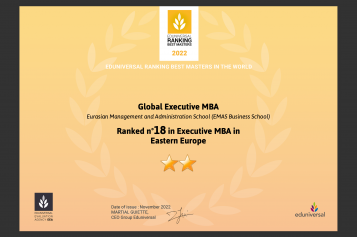
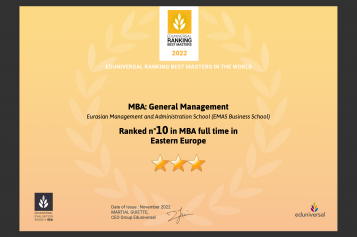
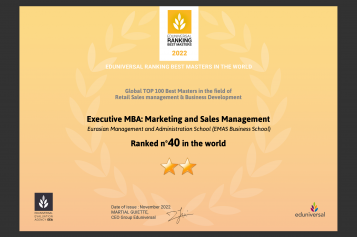
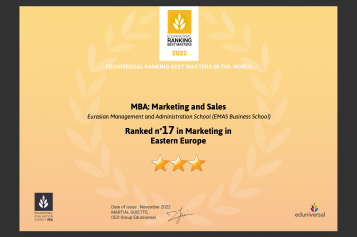
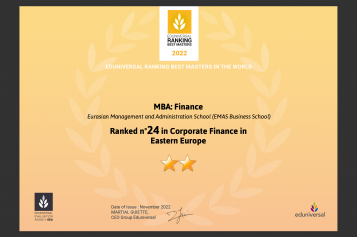
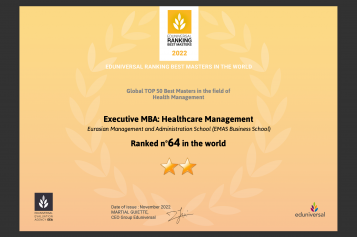





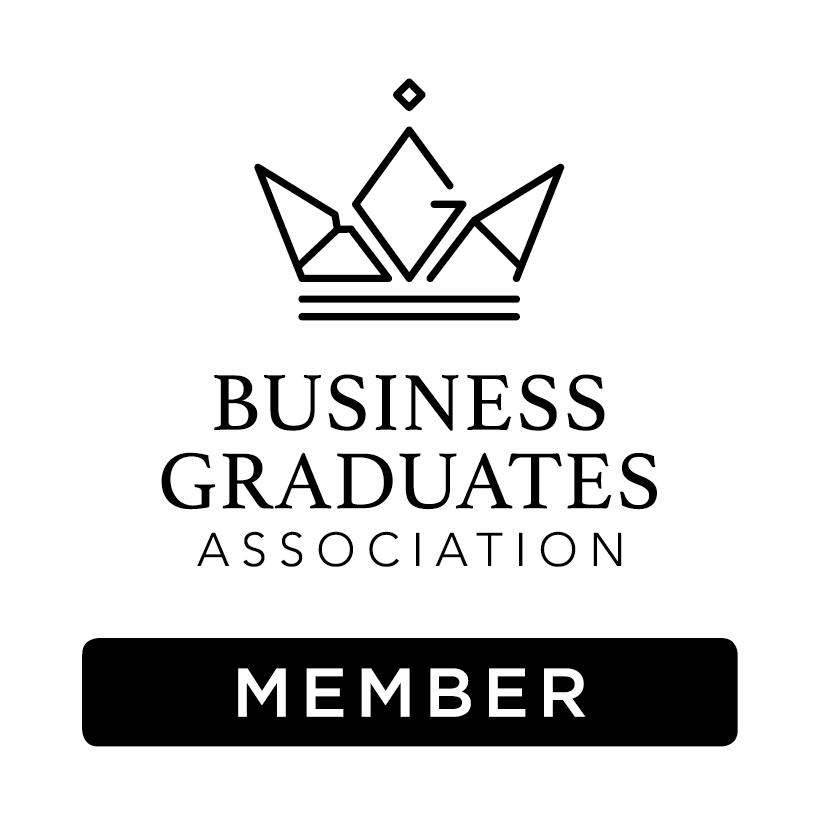
 © 2009-2024.
© 2009-2024.